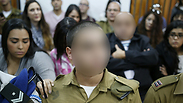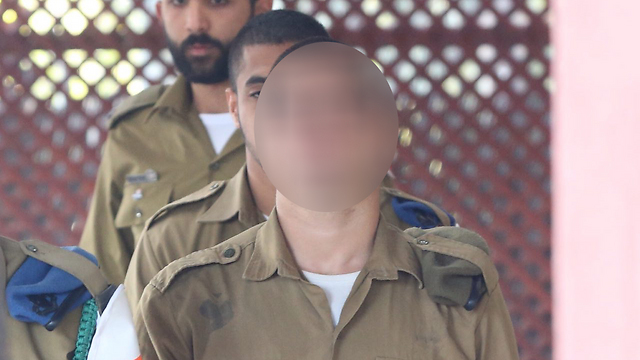
A military judge decided on Friday to uphold a previous ruling to releasethe Kfir Brigade soldier who shot dead an already-neutralized terrorist in Hebron to a five-day open detention, rejecting an appeal of the decision by the Military Advocate General's Office.
Qastina Military Court Judge Lt.-Col. Ronen Shor on Thursday rejected the prosecution's request to extend the remand of the soldier and decided to release him to open detention at the Kfir Brigade's base in the Jordan Valley for the next week.
The soldier has been arrested, though not yet charged. The prosecution initially said it was a murder investigation, but on Thursday prosecutors told a court they were looking into manslaughter charges.
The military prosecution argued against the decision, saying that he is not cooperating with investigators.
At first, his lawyers said the soldier was willing to conduct a reconstruction of the incident and be confronted with soldiers who testified against him - but not undergo a polygraph test.
Now, however, the prosecution says that the soldier "refuses to conduct a reconstruction of the incident or to be confronted with other witnesses (except for one soldier with whom the soldier has no real disagreement), and even stated he does not remember things reported by witnesses who were on the scene."
Chief military prosecutor Col. Sharon Zagagi-Pinhas said that "the evidence present a very clear picture of what happened, which bases the suspicions against him."
Col. Zagagi-Pinhas went on to say that "the soldier claimed several times during the investigation that the terrorist tried to reach for a knife that was 'within reach' of him, while the documentation in the video presents a different situation, in which the knife was a significant distance away from the terrorist, who was in serious condition as it is."
"The soldier," she said, "gives evasive answers whenever confronted with the questions that arise from his version of events. The soldier's changing version raises serious doubts about the credibility of the defense's claims, to put it mildly."
"The video has nuances and it speaks for itself. The soldier's comments during the incident indicate on his state of mind and his motive. His claims that he acted of self defense constitute as suppressed testimony," Col. Zagagi-Pinhas noted. "The videos and testimony from the incident indicate that the neutralized terrorist posed no threat. However many movements the terrorist made, none of the other people at the scene, including the commanders standing next to the terrorist, were not alarmed by it and this speaks volumes."
"The soldier," she went on to say, "displayed indifference in shooting the terrorist, and did so without warning his fellow soldiers and commanders who were there."
"The soldier's comments to his commanders immediately following the shooting, according to which 'the terrorist needs to/must die,' further strengthen the suspicions and his motive," Col. Zagagi-Pinhas continued. "The soldier told his friends immediately after the incident 'my friend was stabbed and he deserves to die.'"
Prosecutor Adoram Rigler added that "The soldier's actions were measured, and did not indicate any urgency or alarm. Most of the witnesses say they did not feel they were in danger."
Rigler also addressed the claims the terrorist was wearing a coat while the weather was warm, which supports the soldier's version that he thought the attacker might be carrying an explosive belt. "Other people in Hebron were also wearing warm clothes that morning, it wasn't just the terrorist who was wearing a coat," he said.
The soldier's lawyer Eyal Beserglick responded to the prosecution's accusations, claiming that "We need to step into the soldier's shoes in real time and not in the video. This is a volatile scene of a terror attack, and there were shouting that the terrorist was still alive and had a bomb. The coat the terrorist was wearing was similar to a flak jacket, during a heat-wave. The Magen David Adom paramedics were instructed not to come near the terrorist because there was the threat of an explosive belt."
Beserglick went on to argue that "you can't keep a suspect under arrest based off mountains of speculations. The soldier didn't mean to kill or murder, but to save. A longer, full version of the video shows the only ones looking at the terrorist were the suspect and another civilian. The soldier who was wounded in the attack testified that there was concern of an explosive belt."
He also said the soldier's comments that the terrorist "must/needs to die" should not be seen as desire for revenge, but rather an indication he felt threatened.
"He was emotional in the hours after the incident. He was asked to pick up the terrorist's brain and he's a child. A child soldier but a child," Beserglick said.
Responding to the prosecution's claims that the soldier only mentioned his fear of a bomb hours after the incident, Beserglick said that while the incident was at 8am, the interrogation at the Military's Criminal Investigations Department (CID) was only conducted at 6pm and it was then that the soldier mentioned his concerns.
Judge Brig.-Gen. Doron Piles who presided over the case on Friday rebuked the defense for being inconsistent with its claims about the soldier's fear the terrorist was carrying explosives.
Judge Shor implied on Thursday that the soldier should be charged with unauthorized shooting because he was acting of his own accord, but in proximity to his commanders. But Col. Zagagi-Pinhas rejected that option, saying that the soldier's actions constitute "a forbidden act, which is basis for manslaughter charges."
The soldier's lawyer claimed on Thursday that "there are witnesses in the case who corroborate the suspect's version, according to which there was concern the terrorist was carrying explosives. We know he was not checked for explosives. There are no contradictions or questions, and his testimony can be read over 29 pages of repeated interrogations."
Controversial phone call
In an unprecedented move on Thursday, Prime Minister Benjamin Netanyahu spoke to the soldier's father, promising him a "professional and fair" investigation."I trust the IDF, the Chief of Staff and the investigation 100 percent and I think that you too should trust the commanders and the investigation," Netanyahu told the father, in a phone call made on the request of the family.
"I wanted to say this to you heart-to-heart. Everything you have to present – do so in the framework of the investigation, which is genuine, professional and fair. I ask you to understand this, that you not think for a moment that they will not conduct the most objective and fair investigation of your son. I ask that you pass this message to your entire family," Netanyahu added.
At first, Netanyahu presented a decisive stance against the incident, saying that "what happened in Hebron is no representation of the IDF's values," but during the week softened his position.
Opposition MKs slammed Netanyahu on Thursday, with MK Omer Bar-Lev (Zionist Union) saying that behind the call "there's a dangerous and inciting message."
"Netanyahu took off his prime minister's suit and put on the unrestrained Likud activist's shirt. The prime minister cannot imply that there's room for protest against the IDF and chief of staff," Bar-Lev added.
Meretz leader Zehava Gal-On, meanwhile, said Netanyahu's "blatant attempts to influence the soldier's trial is a new record in the prime minister's disrespect to the rule of law. The prime minister's interference on behalf of a soldier over whom there's consensus in the top levels of the IDF regarding the severity of his actions is a shocking message on the moral level and a dangerous message when it comes to the rule of law."

















